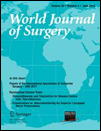Assessment of Swallowing Function Impairment in Patients with Benign Goiters and Impact of Thyroidectomy: A Case Control Study
Presented in part as a poster during International Surgical Week 2011, Yokohama, Japan, August 28–September 1, 2011 [World J Surg 35(S1):S348–S349, abstract 0914.].
Abstract
Background
Swallowing-related quality of life (QoL) in patients with benign thyroid goiters is not much studied. The aim of this study was to assess swallowing function impairment in patients with benign goiters, compare it to a control population, and also find the impact of thyroidectomy and various factors on the outcome of swallowing function.
Methods
We performed a prospective case–control study from September 2009 to September 2011 which consisted of 124 patients who were to undergo primary thyroid surgery and 100 age- and sex-matched controls. A translated and validated modified swallowing quality-of-life (SWAL-QOL) questionnaire was used to assess patients’ perception of dysphagia. Presurgery scores of patients and controls and pre- and postsurgery scores (>6 months after surgery) of patients were compared.
Results
The mean age of males and females in the control and patient groups were 37.7 vs. 39.5 years and 37.4 vs. 39.8 years, respectively. Twelve patients (9.7%) complained of dysphasia at presentation. Sixty-three patients (50.8%) underwent total thyroidectomy and 61 (49.2%) had hemithyroidectomy at the time of initial evaluation, 75, 23.4, and 1.6% of patients were euthyroid, hyperthyroid, and hypothyroid, respectively. Presurgery scores of patients in all of the 11 domains of the SWAL-QOL were lower compared to those of controls. Comparing separately with the matched controls, females had significant differences in nine domains (except for sleep and fatigue) of the SWAL-QOL questionnaire but males did not. Postoperatively, both male and female patients showed significant improvement in the scores of all the domains. Female gender, hyperthyroidism, thyroid nodularity, retrosternal extension, procedure, and weight of the resected specimen were the factors associated with significant improvement in various domains.
Conclusion
Dysphagia seems to be an underestimated problem in patients with benign goiters. Uncomplicated thyroidectomy results in significant improvement in swallowing-related QoL irrespective of patient profile and extent of thyroidectomy.




